Why study PGCE Secondary with QTS (school-led) at LJMU?
Become a superb Secondary teacher at LJMU. Graduate with a Postgraduate Certificate in Education (PGCE) and Qualified Teacher Status (QTS) for the 11-16 age range.
- Train within a school setting and be involved in school life from the first day of term
- Choose from Secondary teacher training routes (see Details tab for more information)
- Follow a curriculum developed and delivered in partnership with outstanding local schools
- Learn from expert teachers
- Prepare for a career as an innovative and creative teacher with one of LJMU's excellent Lead Partners
About this course
Take the School-led route into Secondary teaching with LJMU and gain Qualified Teacher Status and invaluable classroom experience.
LJMU's Initial Teacher Education programmes are designed to develop reflective practitioners who are able to apply a deep understanding of the curriculum, learners and learning to impact on the development and achievement of young people.
Training on the School-led pathway includes substantial time spent in school led by experienced practitioners. Bursaries are available on the programme, depending on your degree classification and subject area.
The School-led pathway is offered by a number of school consortia, each with a Lead Partner, who works with LJMU to develop their training programme. As each School-led programme is distinctive, you are advised to check full details of training and requirements with the Lead Partner before applying.
Applications for places with our School-led consortia are made directly to Lead Partners via DfE Apply. The interview and selection process is conducted by school staff in association with LJMU.
For the training of Secondary teachers, LJMU work in partnership with the following School-led consortia:
Our Lead Partners for 2023-24 are:
Archbishop Blanch School, Liverpool https://www.abblanch.com/school_direct_partner/
The Sandstone Trust, based at Tarporley High School, Cheshire
https://cvtsa.co.uk/become-teacher
The Learning Alliance, based at Knutsford Academy, Cheshire
https://knutsfordacademy.org.uk/staff/teacher-training
North West Learning Partnership, St Helens
https://northwestlearningpartnership.co.uk/index.php/workstreams/school-direct
Turton School, Bolton
https://schooldirect.turton.uk.com/
The Heath School, Runcorn
https://www.heathschool.org.uk/page/?title=School+Direct&pid=81
Weatherhead High School, Wallasey, Wirral
https://weatherheadhigh.co.uk/join-us/school-direct/
Wigan & West Lancashire Catholic School Direct
https://www.catholicsd.org.uk/
All courses lead to Qualified Teacher Status and support the development of your: critical understanding of educational theory and practice, reflective practice linked to professional development and practitioner research skills for effective teaching and learning. Your training will also enhance your understanding and the application of your subject knowledge.
Courses can be viewed on the government's Get into Teaching website.
Professional Body Recognition
In June 2023, Secondary Initial Teacher Training received a “good” rating following a rigorous 4-day inspection. Ofsted noted many strengths in provision, which are noted below.
Leaders have designed an ambitious curriculum that goes beyond the DfE’s core content framework and is underpinned by appropriate and pertinent research. Student teachers discuss and debate relevant theory in the centre-based training and are given opportunities to apply their understanding in placement schools.
Trainees’ professional and subject-specific studies are clearly and purposefully interwoven at this partnership. For example, trainees get a secure grounding in generic pedagogy, as well as the subject-specific knowledge that they need to teach their subject well. Tutors and mentors help trainees to understand the connections between what they are learning and how to use and apply this knowledge in placement schools.
The provider has developed a network of strong relationships with partner schools. Communication between the different partners is a strength. Furthermore, all partners display a strong commitment to supporting the ambition of social justice for all pupils. Student teachers understand the importance of breaking down barriers to learning for disadvantaged pupils and for pupils with SEND and also learn about ensuring equality of opportunity for all pupils in their care.
Course modules
Discover the building blocks of your programme
Discover the building blocks of your programme
Reflecting on Teaching and Learning – 40 credits
This module is designed to enable student teachers to systematically develop, demonstrate and critically reflect on evidence of competence across all areas of the LJMU ITE Curriculum to ensure that the Teachers’ Standards are met at the end of the programme and Qualified Teacher Status (QTS) can be awarded.
This module focuses on the teaching placement (minimum 120 days) in a Home School and Alternate Placement. Students plan and evaluate their school-based practice and are supported by mentors and tutors who assess their progress against the LJMU ITE Curriculum. To pass the module and meet the competency requirements, student teachers must pass the placement experience and triangulation process. Student teachers must also complete a Early Career Profile (ECP) outlining targets for early career development.
Becoming a Professional Teacher – 20 credits
The aim of this module is to develop student teachers' understanding of both subject-specific and general pedagogies, and to develop competent and knowledgeable teachers with an understanding of learning, teaching and assessment.
Students will reflect on both the theoretical and practical understanding of their subject and phase, including subject knowledge and effective teaching approaches. Taught sessions will include current relevant literature relating to how pupils learn, planning for learning, curriculum and progression, questioning & dialogue, transition, classroom management (incl. behaviour), assessment and recording (KS3 and KS4), including formative and summative assessment and progress.
This module develops student teachers as critical reflective practitioners, developing knowledge and expertise of effective approaches in learning, teaching and assessment.
Education and Schooling – 20 credits
This module provides an option to complete a postgraduate Initial Teacher Education (ITE) programme with an alternative exit award WITHOUT recommendation for Qualified Teacher Status (QTS). In this module, students will develop a critical understanding of the contemporary policy landscape of education and schooling in England, with reference to educational research and scholarship, informed by personal observation of practice.
Pathways to QTS
- Art and Design: Secondary with QTS
- Biology: Secondary with QTS
- Chemistry: Secondary with QTS
- Computer Science: Secondary with QTS
- Design and Technology: Secondary with QTS
- Geography: Secondary with QTS
- History: Secondary with QTS
- Mathematics: Secondary with QTS
- Music: Secondary with QTS
- Modern Foreign Languages: Secondary with QTS
- Physical Education: Secondary with QTS
- Physics: Secondary with QTS
- Physics with Mathematics: Secondary with QTS
- Performing Arts (Dance): Secondary with QTS
- Performing Arts (Drama): Secondary with QTS
- Religious Education: Secondary with QTS
Further guidance on modules
Modules are designated core or optional in accordance with professional body requirements, as applicable, and LJMU’s Academic Framework Regulations. Whilst you are required to study core modules, optional modules provide you with an element of choice. Their availability may vary and will be subject to meeting minimum student numbers.
Where changes to modules are necessary these will be communicated as appropriate.
Optional Modules
Becoming a Professional Teacher (3-7)
20 credits
20 credits
This module focuses on the teaching placement (minimum 120 days) in a Home School and Alternate Placement, including the tracking and recording of mentoring and progress in relation to the Core Content Framework and assessment against the Teachers' Standards. To pass the module and meet the competency requirements, student teachers must pass the placement experience and triangulation process. Student teachers must also complete an Early Career Profile (ECP) outlining targets for early career development
Becoming a Professional Teacher (5-11)
20 credits
20 credits
This module focuses on the teaching placement (minimum 120 days) in a Home School and Alternate Placement, including the tracking and recording of mentoring and progress in relation to the Core Content Framework and assessment against the Teachers' Standards. To pass the module and meet the competency requirements, student teachers must pass the placement experience and triangulation process. Student teachers must also complete a Early Career Profile (ECP) outlining targets for early career development.
Reflecting on learning, teaching and assessment (3-7)
40 credits
40 credits
This module develops student teachers as critical reflective practitioners, developing knowledge and expertise of key subject and / or phase teaching approaches to learning, teaching and assessment.
Reflecting on learning, teaching and assessment (5-11)
40 credits
40 credits
This module develops student teachers as critical reflective practitioners, developing knowledge and expertise of key subject and / or teaching approaches to learning and teaching.
Planning and Assessing for Progress
40 credits
40 credits
The module focuses on enhancing trainee teachers' knowledge and understanding of effectively planning learning sequences, considering both quantitative and qualitative data and educational theory. It aligns with the planning of lesson sequences, requiring trainees to submit medium-term plans and related resources as assessment evidence.
Planning and Assessing for Progress
40 credits
40 credits
This module aims to develop trainee teachers knowledge and understanding of planning effective sequences of learning, taking into account quantitative and qualitative data and educational theory.
This module links to the planning of a sequence of lessons, and requires that trainees submit medium term planning and other relevant resources as evidence to support the assessment
Evidencing Impact on Learners
20 credits
20 credits
This module is designed to enhance trainees' knowledge and understanding of educational research methodology, methods, and the utilization of data for educational planning, learning promotion, and progress assessment. It specifically emphasizes the relevant research techniques suitable for initial teacher training and early career development.
Evidencing Impact on Learners
20 credits
20 credits
The module aims to develop trainees knowledge and understanding of educational research methodology and methods, and how data can be used to inform planning, and promote learning and progress.
This module focuses on educational research methodology and methods appropriate for initial teacher training and early career development.
Education and Schooling
20 credits
20 credits
This module provides an option to complete a postgraduate Initial Teacher Education (ITE) programme with an alternative exit award WITHOUT recommendation for Qualified Teacher Status (QTS). In this module, students will develop a critical understanding of the contemporary policy landscape of education and schooling in England, with reference to educational research and scholarship, informed by personal observation of practice.
Pathways to QTS
- Primary Key Stage 1/2 (5-11 years) with QTS
- Primary Foundation Stage/Key Stage 1 (3-7 years) with QTS
- Primary with Mathematics Specialism (5-11 years) with QTS
- Primary with Physical Education Specialism (5-11 years) with QTS
Professional accreditation/links
Our Initial Teacher Education courses are monitored by Ofsted - the Office for Standards in Education.
In our most recent inspection (June 2023), inspectors graded both Primary and Secondary Initial Teacher Education provision at LJMU as ‘Good’ under the new, more demanding Inspection Framework.
Inspectors made frequent reference to the strength of the partnerships with schools – including our 10 school-led partners and hundreds of other local and regional primary and secondary schools where students undertake professional practice placements. Meaningful partnership, they said, enabled trainees to be high-achieving both in quality and aspiration.
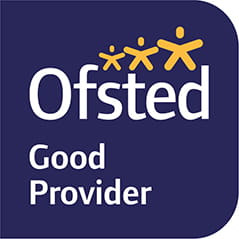
Your Learning Experience
An insight into teaching on your course
Study hours
Although you will spend the majority of your time teaching in school there are regular university-based training sessions at the LJMU Mount Pleasant Campus in the City Centre. Some of your training may be delivered by and in partner schools.
As this is a postgraduate course, you should expect to undertake a significant amount of independent study and preparation, not only to support your course assignments, but also your school-based work.
Teaching methods
School based training involves the preparation and delivery of learning sequences and lessons to small groups and whole classes of learners, with expectations and workload increasing during the course. This work is supported by your teacher-mentor who will support your professional learning experience in school.
The course is delivered through a variety of teaching methods including lectures, seminars, interactive workshops, group discussion and reflection, problem solving and micro-teaching. We also make full use of the University's Virtual Learning Environment.
This intense programme is tightly focused on providing you with the skills and knowledge required. Tutorial support is an important part of the process and you will receive a personalised service that will enable you to set targets and achieve your potential.
Your Personal Tutor will meet with you to monitor your progress, provide guidance and advice and set targets for your development.
You will also be allocated a Teacher Mentor who will organise and supervise your school-based training. Your mentor will be supported by your LJMU Liaison Tutor who will stay in regular contact throughout the course and visit your school several times to monitor your progress.
How learning is monitored on your programme
To cater for the wide-ranging content of our courses and the varied learning preferences of our students, we offer a range of assessment methods on each programme.
Where you will study
What you can expect from your School
You will have access to all of the classroom and teaching facilities provided by the schools within your consortium as well as the expertise of educational professionals at LJMU.
In addition, your university sessions will be based in the new Education Building in the heart of the Mount Pleasant campus, the School of Education features a wide range of cutting-edge facilities, including a pedagogy room, lecture rooms, computing facilities and a nearby Outdoor Learning Zone for our Natural Curriculum projects. Students also benefit from independent study spaces, a close-by cafeteria and library, and access to student welfare and support.
Working with LJMU has enabled us as a School led Partnership to develop unique ITT programmes in response to both trainees' and schools' specific needs. LJMU are a partnership who support both our aims and our trainees well. We are proud of the ITT programmes which we have developed and look forward to continuing to develop innovative, supportive, and highly effective training for tomorrow's teachers
Course tutors

Sarah Hindhaugh
- Head of Secondary Programmes
-
 Lecturer/Senior Lecturer
Lecturer/Senior Lecturer -
 Lecturer
Lecturer -
 Lecturer/Senior Lecturer
Lecturer/Senior Lecturer
Career paths
Further your career prospects
LJMU has an excellent employability record with 96% (HESA 2018) of our postgraduates in work or further study six months after graduation. Our applied learning techniques and strong industry connections ensure our students are fully prepared for the workplace on graduation and understand how to apply their knowledge in a real world context.
LJMU has an excellent employability record with 96% (HESA 2018) of our postgraduates in work or further study six months after graduation. Our applied learning techniques and strong industry connections ensure our students are fully prepared for the workplace on graduation and understand how to apply their knowledge in a real world context.
Many schools involved in School-led training are seeking to fill a vacant post at the end of the course, though there is no guarantee of employment.
During your training there will be ample opportunities for engagement with relevant local employment organisations including schools and teacher recruitment agencies through on campus events.
You will be encouraged to join the relevant professional association for your subject or area of study, providing the opportunity to engage with wider networks of teachers and others interested in your chosen area.
Most of our students go on to work in schools and colleges, locally and nationally, in the state or independent sectors.
Teaching provides a variety of career pathways leading to specialist roles in schools and colleges ranging from pastoral care and subject leadership right through to school leadership positions.
Having gained experience in teaching, a number of graduates move into associated professions such as educational psychology, consultancy, and roles in the education service sector outside of schools.
Fees and funding
Tuition Fees:
- Home fee:
- £9,250
Fees
The fees quoted at the top of this page cover registration, tuition, supervision, assessment and examinations as well as:
- library membership with access to printed, multimedia and digital resources
- access to programme-appropriate software
- library and student IT support
- free on-campus wifi via eduroam
Additional costs
Although not all of the following are compulsory/relevant, you should keep in mind the costs of:
- accommodation and living expenditure
- books (should you wish to have your own copies)
- printing, photocopying and stationery
- PC/laptop (should you prefer to purchase your own for independent study and online learning activities)
- mobile phone/tablet (to access online services)
- field trips (travel and activity costs)
- placements (travel expenses and living costs)
- student visas (international students only)
- study abroad opportunities (travel costs, accommodation, visas and immunisations)
- academic conferences (travel costs)
- professional-body membership
- graduation (gown hire etc)
Funding
There are many ways to fund postgraduate study for home and international students. From loans to International Scholarships and subject-specific funding, you’ll find all of the information you need on our specialist postgraduate funding pages.
Please be aware that the UK’s departure from the EU may affect your tuition fees. Learn more about your fee status and which tuition fees are relevant to you.
- International fee:
- £17,400
International Scholarships and payment plans
Liverpool John Moores University is committed to supporting international students by providing a range of scholarships and flexible payment plans to help students manage their tuition fees.
Scholarships
LJMU provides a variety of scholarships to support international students. Scholarships are available to self-funded students who have accepted their offer and met all the conditions outlined in their offer letter. Students must also demonstrate that they can cover living costs, travel, and other expenses associated to studying at the university. Postgraduate scholarships include tuition fee reductions and are often offered in partnership with external funding organisations.
All self-funded international students are eligible for an automatic scholarship worth up to £4,000. For more details and to view our full list of scholarships, visit the international scholarship webpages.
Deposit
All students must pay a £5,000 deposit before they can receive their CAS letter.
For more information view our deposit page.
Tuition Fee Payment Plan
After paying their £5,000 deposit, students have the option to pay their fees in full or in three equal instalments minus any internal scholarships and discounts. There are two payment options available for international students. You can either pay your tuition fees in full before enrolment or opt for a payment plan. With the payment plan, you can pay your fees in three instalments after making your £5,000 deposit. The first instalment is due before enrolment.
All payments should be made through Flywire. Full details can be found in the How to Pay Guide.
Early Bird Tuition Fee discount
We are excited to introduce a £500 Early Payment Discount to all self-funded international students. Eligible self-funded students who pay their fees by the required deadlines will get a discount which will be automatically deducted from the 1st year of tuition fees.
To see the required deadlines please visit the webpage
Funding
There are many ways to fund postgraduate study. From loans to International Scholarships and subject-specific funding, you’ll find all of the information you need on our specialist postgraduate funding pages.
Please be aware that the UK’s departure from the EU may affect your tuition fees. Learn more about your fee status and which tuition fees are relevant to you.
Full-time PGCE students are eligible for the same range of financial support as undergraduate students.
You will have access to:
- a non means-tested student loan to cover your tuition fees
- a means-tested student loan to help cover your living expenses
- a means-tested maintenance grant, which does not have to be paid back
- a means-tested LJMU Bursary worth up to £500, which does not have to be paid back
For the latest information about bursaries and funding, please visit the Get Into Teaching website.
Fees
The fees quoted at the top of this page cover registration, tuition, supervision, assessment and examinations as well as:
- Library membership with access to printed, multimedia and digital resources
- Access to programme-appropriate software
- Library and student IT support
- Free on-campus wifi via eduroam
Additional costs
Although not all of the following are compulsory/relevant, you should keep in mind the costs of:
- accommodation and living expenditure
- books (should you wish to have your own copies)
- printing, photocopying and stationery
- PC/laptop (should you prefer to purchase your own for independent study and online learning activities)
- mobile phone/tablet (to access online services)
- field trips (travel and activity costs)
- placements (travel expenses and living costs)
- student visas (international students only)
- study abroad opportunities (travel costs, accommodation, visas and immunisations)
- academic conferences (travel costs)
- professional-body membership
- graduation (gown hire etc)
Entry requirements
You will need:
Qualification requirements
Undergraduate degree
- a minimum a 2:2 honours degree (some Lead Schools will require a 2:1). You should check the individual requirements on DfE Apply.
GCSEs and equivalents
- GCSE Grade 4/C or equivalent in English, Maths and Science for Primary teaching and English and Maths for Secondary teaching - level 2 numeracy and literacy not accepted
Further information
-
Extra Requirements
- a demonstrable interest in teaching within the curriculum area/age range. You could show this in a number of ways – time spent in schools, knowledge of a chosen curriculum area, relevant practical experience.
- Deferred entry for the next academic year is not accepted for this programme.
- Shortlisted applicants will be invited to attend a selection event
- A minimum of 10 days’ work experience in a UK Primary or Secondary school is normally required prior to commencing the programme. We can help to arrange this for successful applicants
- All offers are conditional on applicants meeting the Department for Education’s standards for physical and mental fitness to teach and clearance to work with children with a satisfactory Enhanced DBS Disclosure
-
RPL
- RPL is not accepted on this programme
International requirements
IELTS
- IELTS score 7.0 (Minimum 6.5 in each component)
How to apply
Securing your place at LJMU
If you want to join a PGCE with us, you will need to apply through the Apply for Teacher Training service here https://www.gov.uk/apply-for-teacher-training
Applications can be made via Apply to the Lead Partner. Each applicant will be considered in consultation with an LJMU Admissions Tutor and may be asked to attend a selection event in school. The selection process will be led by the school teachers and Senior Leaders and may involve LJMU Tutors.
Ability
Applicants will be assessed for their:
- depth of relevant subject knowledge
- potential to work effectively at Masters level
- ability to work with others in teams
- ability to manage people and projects
Attitude
Applicants will be expected to demonstrate:
- an interest and enthusiasm for their chosen subject area
- an ability to make learning exciting and meaningful to young people in a range of contexts
- commitment to supporting learners in areas of challenging social context
- enthusiasm and resilience
Courses can be viewed on the government's Get into Teaching website.
Location
You should live within reasonable travelling distance of the University and our partner schools for the duration of the course.
Selection events
Selection is based on performance in an interview, teaching and written tasks and may involve the school's learners. The selection process will be led by the schools' Teachers and Senior Leaders and may also involve LJMU Tutors.
Your performance in each part of the selection process is graded and a final decision is made on your performance across the day. Full details of the interview process will be sent to you in advance of the selection event.
Prior to entry
You will need to meet the Department for Education's standards for physical and mental fitness to teach and clearance to work with children. Further information, including a Declaration of Health questionnaire and details of how to apply for a Disclosure and Barring Service (DBS) Enhanced Disclosure, will be sent to you after you have firmly accepted an offer."
Your university life
From accommodation and academic support to clubs and societies. Find out what LJMU has to offer.
Talk to our students
Connect with a current LJMU student for advice and guidance on university life, courses and more.
See what our students are saying
At LJMU we want you to know you’re making the right choice by studying with us. You can see what our students are saying about their experience with us through their reviews on the following websites:
Related Links
News and views
Browse through the latest news and stories from the university
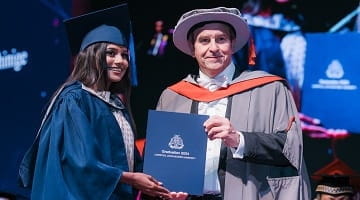
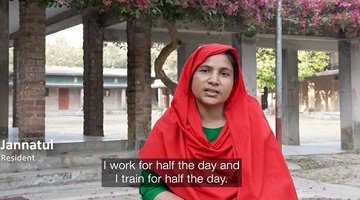

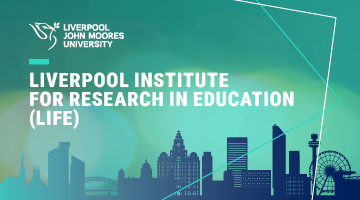
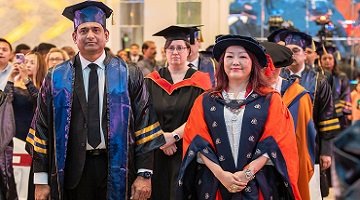

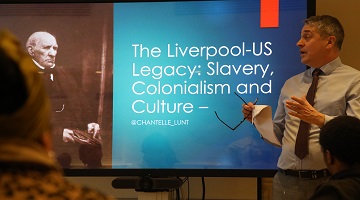
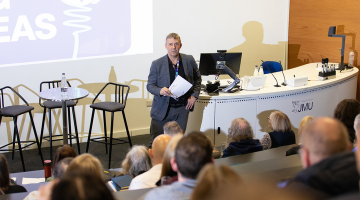


The University reserves the right to withdraw or make alterations to a course and facilities if necessary; this may be because such changes are deemed to be beneficial to students, are minor in nature and unlikely to impact negatively upon students or become necessary due to circumstances beyond the control of the University. Where this does happen, the University operates a policy of consultation, advice and support to all enrolled students affected by the proposed change to their course or module.










